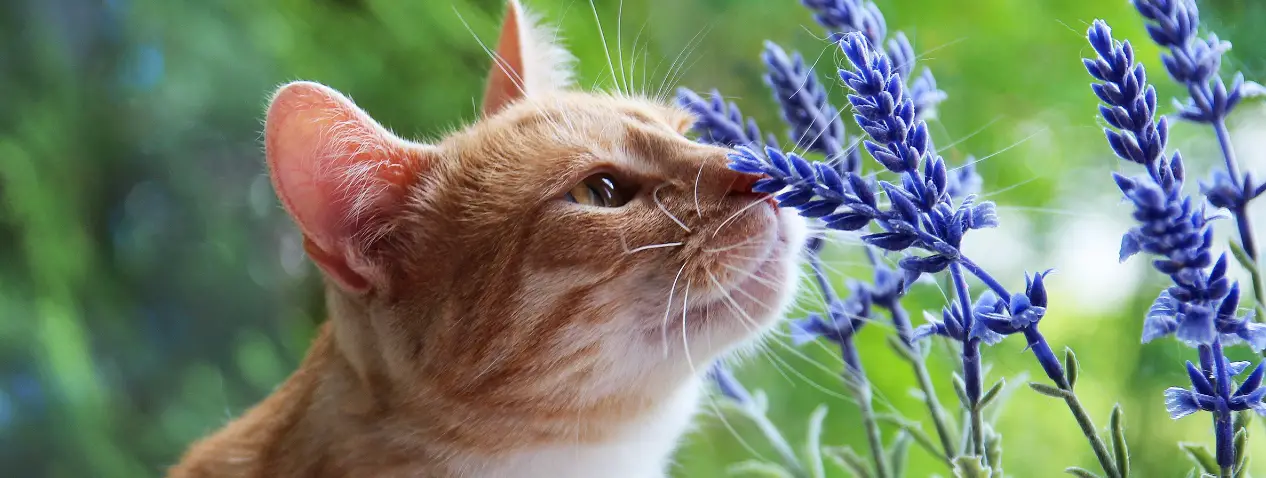Flea treatments are still safe for most cats, but even if such cases are rare, there are always cats sensitive to molecules like permethrin and pyrethrins included in flea medicine, which would have been better treated naturally against fleas, and that’s what I’m going to talk about in this article.
- Chemical flea treatments are still safe and helping cat owners
- Why these conventional flea treatments are not always the solution
- My Thoughts on using chemical flea treatment on cats
- Flea medicine alternative for cats
- Are flea treatments safe for kittens and senior cats?
- Some natural ways you can consider for fleas on cats
- Homemade flea spray recipes
- Final Thoughts
Chemical flea treatments are still safe and helping cat owners
First of all, you should know that since our readers ask us what flea products are safe to use and those we recommend and how to get rid of fleas on my cat “fast” … etc., we’re obliged to recommend certain flea meds known as relatively safe to use and give some safety advice with that.

What follows is the result of a well-researched topic and my own opinion on the subject, and I’ll also give some alternative solutions if you prefer to treat your cat and its environment naturally against fleas.
Please read this article carefully to get an idea of what’s best for your cat when it comes to choosing the right way to fight these parasites.
Why these conventional flea treatments are not always the solution
First of all, when manufacturers designed these flea medicines, they were thinking more about cat owners than cats themselves.
All their advertising is designed to make us like these products because they’re easy to use because you only have to give them to your cat once a month … etc., whereas they should have done more research to reduce their side effects and why not develop effective products with no side effects, based on herbs … etc.
There’s always a risk in using these commercial flea products to treat your cat, especially some oral flea tablets.
The problem is that if your cat can’t tolerate these drugs, you may see side effects several days after treatment, not necessarily on the same day or the next!
Veterinarians don’t really have the time or resources to check every flea medicine, so they rely on manufacturers to really test their products and prove their safety for cats.
When only a tiny percentage of the cats on which these flea medicines are tested show side effects, they decide that the product is safe and that there is only a risk that your cat will have some side effects, and here’s what to do if you notice them in your cat after treatment, and their first instruction is to invite you to take your cat to the vet or to a center for treatment against poisoning!
So you need to be responsible and make the right decision yourself whether to treat your cat with these chemical treatments or adopt a more natural approach that may require you to be more present and attentive, but that won’t endanger your cat’s health and well-being, since fleas will always find a way to get to your cat.
My Thoughts on using chemical flea treatment on cats
These flea medicines contain neurotoxins and letting them infiltrate your cat’s skin or giving them to your cat as a treat is a bit risky.
Flea medicine is not a repellent, i.e. the flea will still bite your cat, take a blood meal for it to die and this does not prevent the poor cat from being bitten by the flea!
When you use flea collars, flea sprays … etc during the warm season, as soon as your cat or dog comes into contact with water, the treatment becomes ineffective and the medicine loses its effectiveness.
Most cat parents have become more comfortable choosing the flea treatment themselves, buying and applying it without consulting a vet, which can be a problem, especially in cases where the cat in question has specific health problems.
Some cats have spent the rest of their lives on anti-seizure treatment just after a flea treatment has gone wrong!
Flea medicine is not the final solution to get rid of fleas, flea collars will not protect your cat, and other topical and oral flea treatments, you have to give them to your cat every month and they are a bit expensive not to mention the risk of side effects on your cat!
Unlike your home and its surroundings, which you have to treat against fleas, you can avoid giving your cat preventive flea treatments and only act when you see that he really does have at least one flea in his fur, or you see signs of their presence such as frequent scratching.
Last but not least, the chances of your cat contracting any disease after being bitten by a flea are very low, especially if your cat is super healthy, gets plenty of exercise during the day, and eats healthy as well.
Why inject him with neurotoxins every month to kill a flea after it bites him when you can instead use natural repellents and concentrate your efforts on keeping those fleas away from your cat by treating his environment and the outside of your home and breaking the flea life cycle?
Flea medicine alternative for cats
There are alternatives to these commercially available products, natural alternatives that don’t show results just a few minutes after use, but their effect will be felt over the long term so you’ll end up keeping those fleas off your cat if you keep applying them; let’s talk about it:
The best way to do this is to start feeding your cat healthy food, more fresh food, and avoid feeding him just kibble!
A little bit of coconut oil and fresh garlic in their diet may help as well. Encouraging your cat to move and exercise will also boost its immune system.
Here are some natural solutions to help you get rid of fleas:
- The project suds flea and tick shampoo bar, it’s like a soap bar to bathe your cats with.
- Remove your carpet if you’re not gonna vacuum at least once every 2 days
- Mow down the grass around your house and let the sun get into it
- To get rid of the flea eggs and larvae in your backyard, you can use natural solutions like Nematodes and Diatomaceous earth, just dust these products all around your house and the job is done.
- Spreading cedar oil in your yard every month can help to get rid of them.
- You can just spray your cat with a flea spray based on essential oils (good repellents) or just take a tea spoon of Buck Mountain parasite dust and give your cat a dust bath with this powder.
I invite you to do some more research on these alternative solutions for keeping fleas off your cat without using any chemicals.
Are flea treatments safe for kittens and senior cats?
Flea medicine is often recommended for cats over 8 weeks and 2.5 to 3.5 lbs, which already makes this treatment risky for kittens and cats not yet over this weight.
In both cases of older cats and kittens, I recommend the mechanical solution, i.e. the flea comb, because kittens don’t yet have the strength, especially in terms of their immune system, nor the muscle volume to cope safely with the side effects of these flea treatments.
On the other hand, an older cat has a weakened immune system and has probably also lost weight, making it very sensitive to these flea treatments.
In this case, I recommend regular brushing to remove any fleas or flea eggs, then dipping the flea comb in a glass of water and dish soap.
You can also use flea sprays based on essential oils but don’t overdo it either. You should then concentrate your efforts on preventing fleas from reaching your kitten or older cat, using the natural prevention methods I mentioned earlier in this article.
Some natural ways you can consider for fleas on cats
- Regular Bathing
- Regular brushing using a fine-toothed flea comb
- Sprinkling some food-grade diatomaceous earth on your cat’s stuff.
- Diluted apple cider vinegar or lemon spray as a natural flea spray, just avoid your cat’s face and open wounds when using these sprays.
- Essential Oils in very diluted forms like lavender, cedarwood, and citronella can have flea-repelling properties.
- Regular cleaning and Vacuuming especially areas where your cat spends much of his time.
Homemade flea spray recipes
Let’s finish with these homemade natural flea sprays
Rosemary and Mint Flea Spray
What you need
- 1 cup of fresh rosemary leaves
- 1 cup of fresh mint leaves
- 1 quart of water
How to make it:
- Boil the water and add the rosemary and mint leaves.
- Allow the mixture to steep and cool down.
- Strain the leaves and pour the solution into a spray bottle.
- Lightly spray your cat’s fur, avoiding the face.
Neem leaves Flea Spray
What you need
- 2 cups of distilled water
- 2 tablespoons of dried neem leaves
- 2 tablespoons of dried lavender flowers
How to make it:
- Boil the distilled water and add the neem leaves and lavender flowers.
- Let the mixture steep for several hours or overnight.
- Strain the mixture and pour it into a spray bottle.
- Gently spray your cat’s fur, avoiding sensitive areas.
Chamomile and Almond Oil Spray
What you need
- 1 chamomile tea bag
- 1 cup of water
- 1 teaspoon of almond oil
How to make it:
- Brew the chamomile tea in 1 cup of hot water.
- Allow the tea to cool down and remove the tea bag.
- Stir in the almond oil.
- Transfer the mixture to a spray bottle and apply it lightly to your cat’s fur.
Lemon Flea Spray
What you need
- 1 thinly sliced lemon, don’t remove the peel
- 1 quart of water
How to make it:
- Boil the water and add the sliced lemon.
- Let the mixture steep overnight.
- Pour the solution into a spray bottle.
- Lightly spray your cat’s fur, avoiding the eyes, nose, and mouth. Be careful not to soak the fur.
Apple Cider Vinegar Flea Spray
What you need
- 1 part apple cider vinegar
- 1 part water
How to make it:
- Mix equal parts of apple cider vinegar and water in a spray bottle.
- Gently shake the mixture to combine.
- Spray a small amount onto your cat’s fur, avoiding the face.
Final Thoughts
I’m not saying that all these flea medicines are bad and should never be used, I’m just saying that there is a natural alternative to flea control.
Many products like Frontline, Advantage … do a lot of good for pets and save time and a lot of effort for their parents, they’re easy to use and give almost instant results, but the thing is, that’s just what the people who made them were banking on, they didn’t think too much about all cats!!!!
There is no flea treatment, especially for adult cats or kittens or even for cats suffering from this or that disease and unfortunately, I can only advise these chemical treatments if your cat is well-fed, exercises a lot, and has never had any health problems and on top of that I encourage you to take him to see a vet before each administration of these flea treatments.


